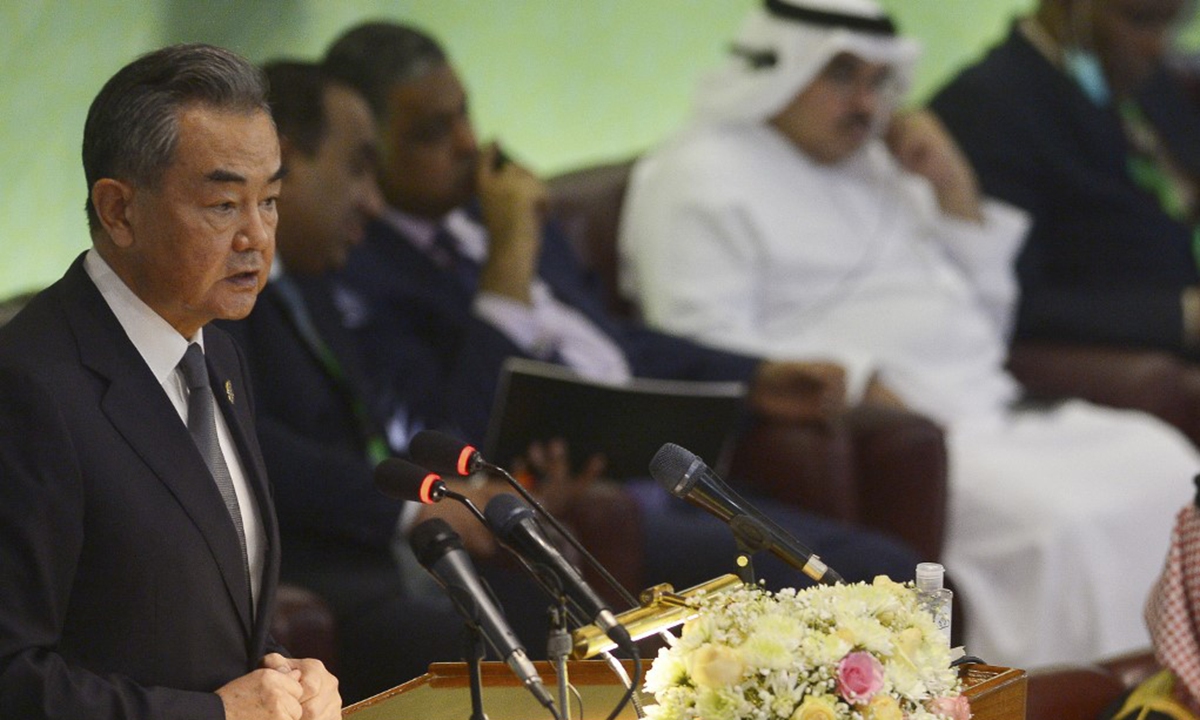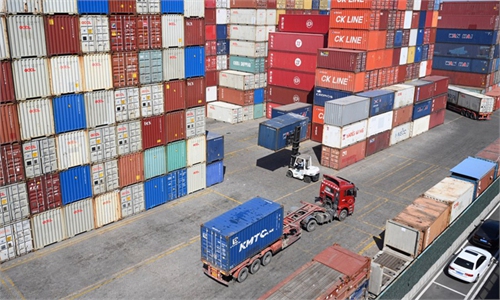China, Islamic world ‘standing closer’ as Chinese FM attends OIC meeting for first time

Chinese State Councilor and Foreign Minister Wang Yi (L) speaks during the 48th session of the OIC Council of Foreign Ministers, in Islamabad,Pakistan on March 22, 2022. Photo: AFP
China and the Islamic world are standing closer with each other while the world is experiencing profound changes, as the Chinese foreign minister was for the first time invited to attend the foreign ministers' meeting of the Organization of Islamic Cooperation (OIC), the biggest international organization of Muslim countries.
With recent signs such as progress in FTA negotiations between China and the Gulf Cooperation Council, and Saudi Arabia in "active discussions" with China to price some of its oil sales to China in yuan, many significant facts have shown that US efforts to hype rumors about Xinjiang have failed to split China and the Islamic world while the two sides have chosen to explore deeper cooperation, said Chinese analysts on Tuesday.
Chinese State Councilor and Foreign Minister Wang Yi said in Islamabad, capital of Pakistan, Monday that China and the Islamic world have a strong desire to build partnerships for unity, justice and development.
During a joint press conference with Pakistani Foreign Minister Shah Mahmood Qureshi, Wang said it is the first time for him to attend in his capacity as the Chinese foreign minister the 48th session of the Council of Foreign Ministers of the OIC in Islamabad.
The OIC is the second largest organization after the United Nations with a membership of 57 states spread over four continents of Asia, Europe, Africa and South America which covers almost all Muslim countries.
Wang noted that his presence at the OIC event reflects the strong desire of China and the Islamic world to further deepen their cooperation, saying the theme of the OIC foreign ministers' meeting - "Building Partnerships for Unity, Justice and Development" - bears special significance under current international circumstances.
Although China has not participated in the OIC events before, it has maintained friendly relations with the OIC member states, said experts. "Because China has a long-standing tradition of supporting Muslim countries to fight for their independence and their struggles against hegemony and imperialism since the Cold War, this makes China and the Islamic world more and more like-minded and share broad consensus on international relations," said Li Haidong, a professor from the Institute of International Relations of China Foreign Affairs University.
With the increasing cooperation in the fields of trade, sci-tech and energy between the two sides, China has replaced the US as the biggest importer of energy resources from many main energy exporters in the Islamic world. It's natural for China and the Islamic world to stand closer to jointly overcome the challenges and deal with increasing uncertainties around the world, said Li.
In January, major members of the OIC like Saudi Arabia, Iran and Turkey visited China, and Special Envoy of the Chinese Government on the Middle East Issue Zhai Jun visited Saudi Arabia from March 13-14 and met OIC Secretary General Hissein Brahim Taha.
"Since Pakistan, China's close friend, is the host of the foreign ministers' meeting this year, inviting China to the event is a collective decision which shows the strategic consensus shared by OIC members," Qiu Wenping, an expert on Islamic studies and a professor at Fudan University, said.
"The world economy is worsening with the ongoing pandemic, with a significant impact on industrial chains. On top of that, US hegemony on international and regional issues has made many in the world turn to China to defend themselves from harm brought by the US," Hua Liming, former Chinese ambassador to Iran and the UAE, told the Global Times on Tuesday.
Since China has become a major power, more and more countries realize that they can and need to turn to China to solve their problems instead of the US, when a number of recent events have suggested how irresponsible the US could be - such as the hasty pullout from Afghanistan and its meddling in the Ukraine crisis that caused a direct military conflict between Russia and Ukraine, Hua noted.
Ties between China and the Islamic world have not been undermined despite the US and its followers continually spreading disinformation and rumors on China's Xinjiang. This just further shows that the vast majority of Muslim countries do not fall into the trap set by Washington, and know that it was the US who brought chaos and disaster to their lands, experts said.
"Xinjiang is the starting point of the Silk Road Economic Belt, and the US has specifically targeted this region as it needs to contain the development of the region and to ruin the China-proposed Belt and Road Initiative," and the vast majority of Muslim countries can see the US intention, Hua said.
Qiu told the Global Times that "based on the long experience of dealing with China, most Muslim countries have found China with high credibility, morality and responsibility, and the disinformation about Xinjiang cooked up by the West can't fool them while China invited many Muslims countries to send delegations to witness the development and improvement of people's lives in Xinjiang."
Especially with the US and its Western allies' role in the "Arab Spring" that caused a huge amount of instability and humanitarian crises, these US-promoted new "crusade" offensives made the Islamic world lose faith and a sense of security toward the West, Qiu said, noting that this makes Muslim countries believe that developing deeper ties with China serves their interests to withstand US and Western hegemonic acts.
Wang has also put forward four proposals on China-Pakistan ties, including deepening counter-terrorism cooperation and maintaining closer multilateral coordination.
Wang noted that the two sides should strengthen coordination on issues such as Afghanistan and Ukraine, jointly practice true multilateralism, oppose power politics, bullying and unilateral sanctions, and work to help the international order advance in a more just and reasonable direction.
The US is now pushing the countries that chose not to follow its sanctions against Russia on the Ukraine crisis to take sides, and the West-led sanctions against Russia have also created greater uncertainty across the world, and this is the "power politics, bullying and unilateral sanctions" that both China and Pakistan, as well as countries with independent diplomacy, should jointly oppose, said experts.



